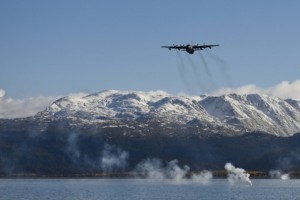
HOMER, Alaska — The 210th, 211th, and 212th Rescue Squadrons of the Alaska Air Guard’s 176th Wing trained on water rescue tactics in Homer Sep. 30 to Oct. 1, along with a boat crew as support personnel.
Continuous rescue scenario training ensures solidified expertise in both peacetime and wartime search-and-rescue missions. Here in Alaska, water rescues are one of the many complex scenarios rescue personnel must contend with.
“Our commitment to rescue is 24/7, 365, non-stop,” said Maj. Jay Casello, the on-scene commander and combat rescue officer with the 212th RQS. “We have to train hard in very challenging environments to be ready to save lives.”
The Wing’s ‘rescue triad’ performed both day and night missions, including personnel jumps and cargo drops on a moving target, flying night water operations, visual search for casualties, and drop zone control for safety and situation management.
Teamwork is a significant piece of smooth operations.
“It takes a lot of hard work from Airmen all through the Wing to make these rescue missions and training successful,” Casello said. “After over 20 years in personnel recovery, I believe the guardian angel, HC-130 and HH-60 rescue squadrons work better together here in Alaska than anywhere else in the Air Force.”
The Alaska rescue squadrons average six water training scenarios a year in a range of weather conditions.
[smoothcategory catg_slug=”state”]
